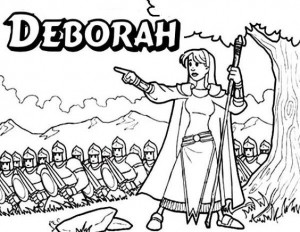| This is the third post in a mini-series tracing the way the seven saviour-judges of Israel prefigure Jesus, The Saviour-Judge. [click link to start series] |
YHWH told Moses about a prophet who would come after him, Acts 3:20-22 tells us Jesus was that prophet, though the Rabbis of Jesus’ day saw Samuel as the fulfillment of that prophecy. Interestingly the first person acknowledged by scripture as a prophet after Moses is Deborah, Judges 4:1, the third Saviour-Judge to lead Israel. In many ways she is the Bible’s strongest woman leader, she is described as “the woman of Lapidoth” so some English translations call her “the wife of Lapidoth” but Lapidoth/לפידת is the feminine plural form of the word lapid/לפיד which means a lamp, a flame, a fire etc and it seems very unlikely a man would be named with a feminine plural word. So other translations assume Lapidoth is a town, even though there is no other reference to it as a place.
 Personally I think it is as likely to be a title or description of Deborah’s practice as it is a place name “the woman of the lamps/lights/flames/fires” would certainly fit what we read about Deborah, she is an inspired and fiery woman; primitive prophecy practices often involved staring into flames; and revelation is a lamp.
Personally I think it is as likely to be a title or description of Deborah’s practice as it is a place name “the woman of the lamps/lights/flames/fires” would certainly fit what we read about Deborah, she is an inspired and fiery woman; primitive prophecy practices often involved staring into flames; and revelation is a lamp.
Deborah is also the only Judge to give a prophetic pronouncement, Judges 4:5-6… when she summons Barak and delivers YHWH’s word about meeting Sisera the Canaanite commander at the River Kishon (means “winding river”).
Barak may have been the military leader, but Deborah was clearly the authority. Barak refuses to go unless Deborah comes with them. So she goes up with Barak and 10,000 volunteers to fight Sisera’s army (which included 900 chariots).
They win of course and It is not my plan to tell the whole story here, just highlight how Deborah’s victory reflects Jesus’. We start to see a bit more in Deborah’s victory song in chapter 5.
The battle was not just against flesh and blood, “new gods where chosen“, Judges 5:8 and these where defeated by a volunteer army (about 1 of every 4 that could have fought, see Judges 5:8&9)….
But the key was that Deborah had put her fiery heart into them, making every one of them a leader:
“My heart to/with Israel’s leaders, the ones freely offering themselves from among the people, bless YHWH” – Judges 5:9
She goes on to describe these men as princes and kings for whom “the stars fought from heaven… against Sisera“, Judges 5:20.
You’re probably begining to see the picture…
Scattered among the seven saviour-judges we find aspects of Christ, so at least one of them should be a prophet speaking the word of YHWH to followers. Like Christ, Deborah goes with those she disciples, inspiring them with her own fiery heart as Jesus baptises us with the Holy Spirit and with fire, and then send us to do battle not with flesh and blood but with principalities and demonic powers. To release on Earth a battle that has already been won in heaven.
A final thought, Deborah’s name is often transated as “Bee” though in reality the word means any insect that makes a noise… but getting behind the name we find it is made up of two parts. The first “dabar”/ךנר means “word”, the second adds the “”ah”/ה was half of the word “Jah” and implied “breathe” or “spirit”. I personally prefer the understanding of Deborah’s name as “breathe word”, it fits a prophet so much more than “noisy insect”.
Christen Forster
Christen has planted churches, been a youth worker, mission administrator and church leaders. The author of several books, Christen is now an itinerant minister, helping churches to step into a more deliberately spiritual experience of the Christian life while at the same time firmly rooting their practice in scripture.
© 2000 - 2024 Christen Forster
Latest posts by Christen Forster (see all)
- The Heart of the Tabernacle - June 6, 2019
- Some Interesting Psalm - May 12, 2019
- God the Word - April 22, 2019
